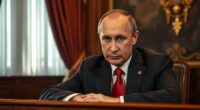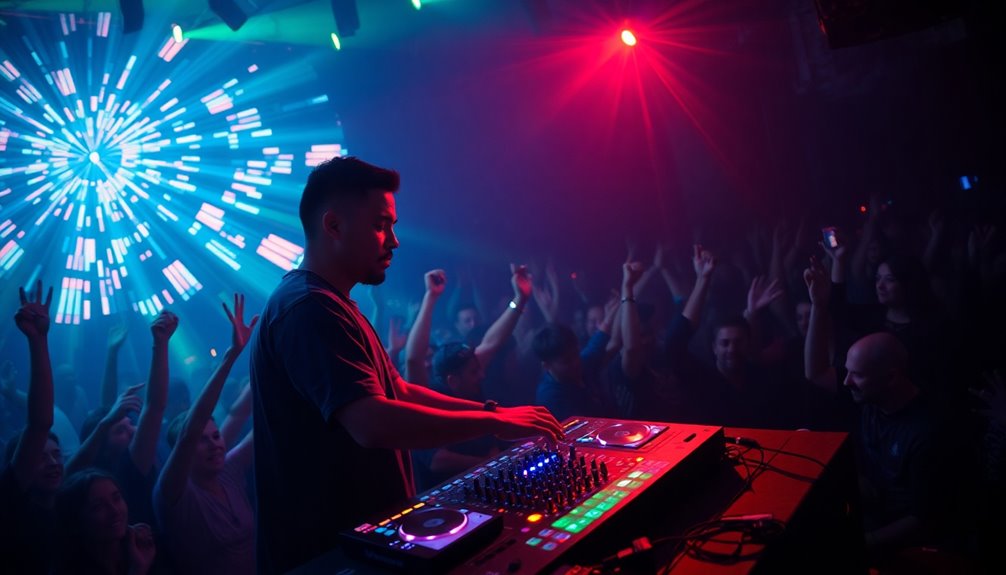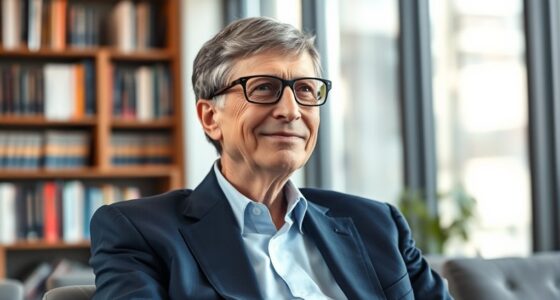Volodymyr Zelenskyy, the current President of Ukraine, is a former comedian and TV star who became a national leader during Ukraine’s ongoing fight for sovereignty. He rose from entertainment fame with his own political style, winning the 2019 election in a landslide. Since taking office, he has led Ukraine through major reforms and fierce conflicts, gaining international recognition. If you want to understand his journey and impact, you’ll find plenty of inspiring details ahead.
Key Takeaways
- Volodymyr Zelenskyy is the current President of Ukraine, elected in 2019 with a populist, anti-corruption platform.
- He transitioned from a popular comedian and actor, notably starring in the TV series “Servant of the People.”
- Zelenskyy led Ukraine through the 2022 Russian invasion, making strategic military and diplomatic decisions.
- His presidency emphasizes reform, transparency, anti-corruption efforts, and strong international alliances.
- He is widely regarded as a symbol of resilience and national unity amid ongoing conflict.
Early Life and Educational Background

Volodymyr Zelenskyy was born on January 25, 1978, in Kryvyi Rih, then part of the Ukrainian Soviet Socialist Republic. His father, Oleksandr, was a computer scientist and professor, while his mother, Rymma, was a retired engineer. Growing up amid Ukraine’s Soviet history, Zelenskyy’s family had a rich background rooted in Jewish heritage and wartime experiences. When he was about four, his family moved to Erdenet, Mongolia, due to his father’s mining work, exposing him to a different culture and tough frontier life. At age nine, they returned to Kryvyi Rih. He attended a good local school, learned Russian as his native language, and later earned a law degree from Kryvyi Rih Institute of Economics. Despite this, he chose a career in entertainment over law. His early exposure to diverse cultures and educational background played a significant role in shaping his worldview and leadership style.
Career in Entertainment and Comedy
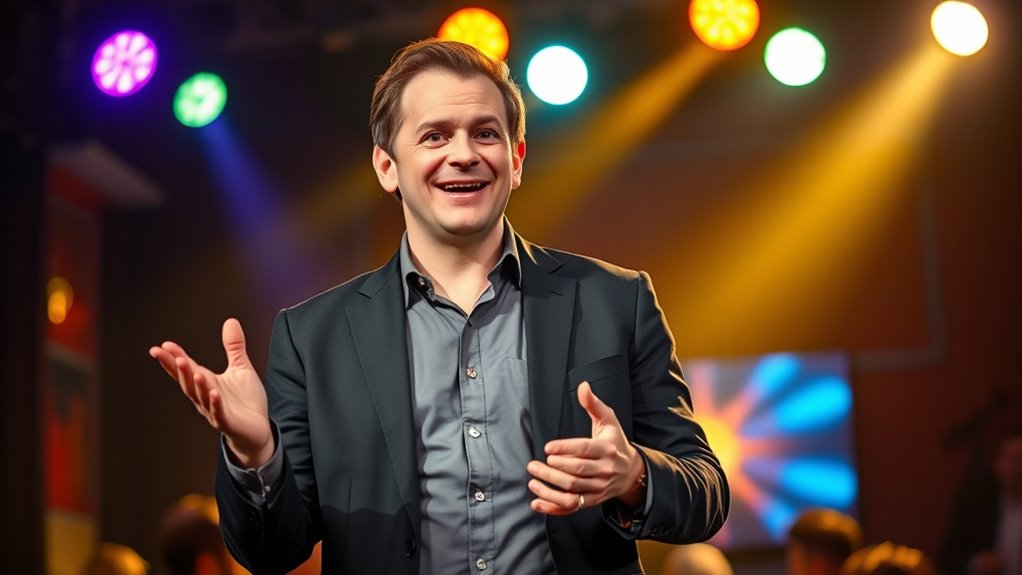
Growing up immersed in Ukraine’s rich cultural landscape, Zelenskyy found his calling in entertainment and comedy. At 17, you join a local KVN comedy team, quickly making a mark. By 1997, you’re invited to the Ukrainian KVN team “Zaporizhzhia-Kryvyi Rih-Transit,” winning in the Major League. That same year, you found Kvartal 95, a comedy troupe that becomes a national sensation. From 1998 to 2003, Kvartal 95 performs across Ukraine and post-Soviet countries, touring often. You leave KVN in 2003 after rejecting a Russian management offer and an antisemitic incident. Shifting into TV, your production company creates popular comedy shows. Your acting career flourishes with roles in romantic comedies, films, and voice acting. Your comedy work considerably boosts your profile and cements your influence in Ukrainian entertainment. Kvartal 95 expanded into a major media and entertainment empire, producing shows, movies, and live performances that resonated with Ukrainian audiences. Additionally, the organization’s use of media production techniques helped it grow into a leading entertainment powerhouse in Ukraine.
Transition to Politics and 2019 Presidential Campaign
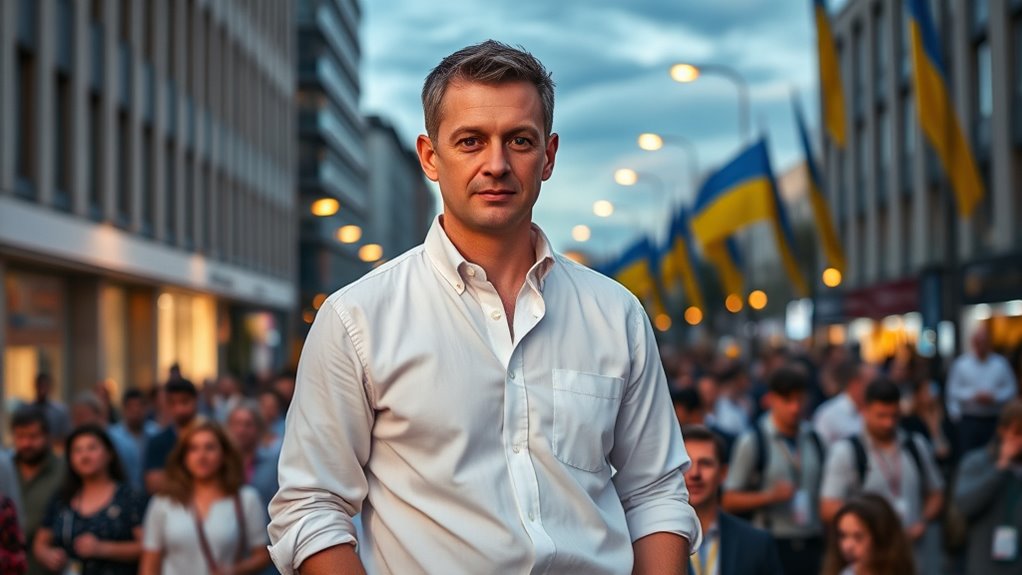
You might notice how Zelenskyy’s campaign broke new ground by running the world’s first fully virtual presidential race, relying heavily on social media and TV while avoiding traditional rallies. His outsider status and populist appeal resonated with voters frustrated with established politicians, helping him secure a landslide victory. This unconventional approach transformed his celebrity fame into a powerful political force, setting Ukraine’s 2019 election apart from past campaigns. He conducted no public speeches or rallies, emphasizing a new style of campaigning that relied on digital platforms to reach voters directly. Additionally, his innovative use of digital campaigning methods played a crucial role in mobilizing support and engaging a broader audience.
Campaign Strategy Shift
Zelenskyy’s passage from entertainment to politics marked a strategic shift that capitalized on his popularity and outsider status. He left his comedy and acting career behind, using his role as a fictional president in *Servant of the People* to build public recognition and political momentum. His announcement of his 2019 candidacy on December 31, 2018, drew immediate media attention, framing his campaign as anti-establishment and anti-corruption—resonating with voters frustrated with traditional politics. He leveraged social media, humor, and charisma to connect with voters, breaking from conventional campaigns. His ties to Kvartal 95 and the TV channel 1+1 helped boost visibility. By positioning himself as an outsider promising reform, he quickly gained ground, culminating in a historic landslide victory in April 2019. This innovative approach also included a focus on direct communication with citizens through digital platforms, bypassing traditional political channels. Furthermore, his ability to adapt campaign strategies based on public sentiment demonstrated the importance of understanding voter needs in modern political campaigns.
Populist Appeal Success
How did Zelenskyy’s background as an entertainer and outsider help him craft a compelling populist appeal during his 2019 presidential campaign? His success as a comedian and actor, especially playing a fictional anti-corruption president in *Servant of the People*, made him relatable and trustworthy. He used humor and straightforward messaging to connect directly with voters, emphasizing honesty and reform. His outsider status resonated with Ukrainians frustrated by corruption and stagnation, promising a clean break from traditional politicians. By leveraging social media and accessible language, he built a personal brand rooted in transparency and accountability. His background helped him appear genuine and non-establishment, making his populist message powerful enough to secure a landslide victory and a strong mandate for change. Additionally, his use of Glycolic Acid as a metaphor for renewing and refreshing Ukraine’s political landscape helped solidify his image as a reformer committed to revitalization.
Electoral Victory and Inauguration

You saw Zelenskyy achieve a landslide victory in 2019, riding a wave of public desire for change with his anti-establishment message. His campaign resonated as a fresh alternative to traditional politicians, promising reforms and transparency. When he was sworn in as president in May 2019, it marked a clear shift toward new leadership and hope for Ukraine’s future. His election was notable as he was the third Ukrainian president to lose reelection, highlighting the country’s dynamic political landscape. This electoral success can also be seen as a reflection of the collective pursuit of spiritual energy and renewal among the Ukrainian people.
2019 Landslide Win
In 2019, Volodymyr Zelenskyy achieved a historic electoral victory by securing approximately 73% of the vote in Ukraine’s presidential runoff, a record-breaking support that signaled widespread public enthusiasm for change. This landslide reflected a clear mandate to overhaul Ukraine’s political system. His support varied regionally, with over 85% in eastern areas like Donetsk and Dnipropetrovsk, and more than 60% in central oblasts such as Vinnytsia. The election results, confirmed as free and fair, led to his peaceful inauguration in May 2019, amid high public expectations. His decisive win marked a generational shift, emphasizing voter frustration with the old guard. This sweeping victory also empowered Zelenskyy with a strong parliamentary majority, ensuring his capacity to pursue reforms.
| Region | Zelenskyy Support (%) | Key Notes |
|---|---|---|
| Eastern Ukraine | Over 85% | Strongest regional backing |
| Central Oblasts | Over 60% | Widespread appeal |
| Western Ukraine | Lower, but leading | Balanced regional support |
| Kyiv (Urban Center) | Very high | Urban support for Zelenskyy |
| Overall Voter Turnout | About 64% | Demonstrates high engagement |
Campaign Anti-Establishment Message
Zelenskyy’s 2019 campaign centered on powerful anti-establishment and anti-corruption messages, resonating strongly with voters exhausted by Ukraine’s entrenched political elites. You saw him as a breath of fresh air, promising to clean up a government plagued by corruption. He positioned himself as a political outsider, leveraging his media background to appeal as a new kind of leader. His campaign tapped into widespread frustration with oligarchic influence and political stagnation. – Promised to fight corruption and drain the swamp. – Campaigned as a genuine outsider, breaking from traditional elites. – Used media savvy to connect with voters’ discontent. – Highlighted the need for urgent reform for Ukraine’s future. – Capitalized on public anger against the old guard, promising change. In addition, his electoral victory was seen as a mandate for anti-corruption reforms, although recent developments have tested his promise to uphold these ideals amid political and international pressures. Recognizing the importance of public trust in sustaining reform efforts, Zelenskyy has sought to demonstrate transparency and accountability in his governance.
Sworn in May 2019
How did Zelenskyy’s electoral victory and inauguration in May 2019 mark a turning point for Ukraine? You saw him win in a landslide, defeating Petro Poroshenko with about 73% of the vote, becoming Ukraine’s youngest president at 41. This election reflected a strong public desire for change amid ongoing war and economic struggles. His promise to serve all Ukrainians signaled a new approach to leadership. The inauguration on May 20 at the Verkhovna Rada was a formal and symbolic event, with foreign dignitaries and domestic officials present. Zelenskyy took the oath, affirming his commitment to Ukraine’s sovereignty, laws, and citizens. The event marked the start of a new six-year chapter, symbolizing hope for reform, transparency, and closer international ties. Additionally, his background in entertainment and communication helped him connect with the public and foster a sense of political renewal.
Major Legislative Achievements and Party Control
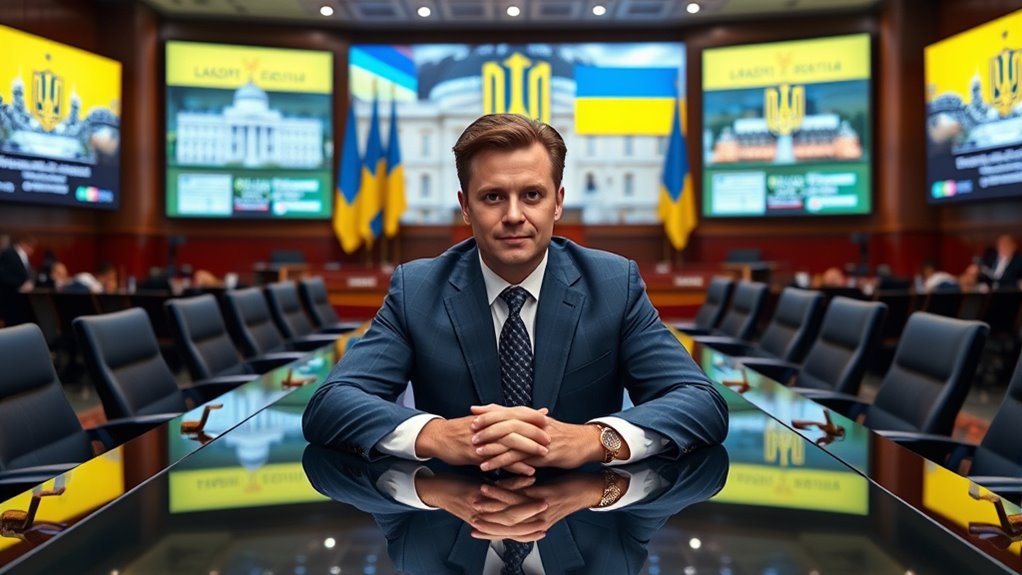
President Zelenskyy has spearheaded significant legislative reforms aimed at tackling corruption, enhancing accountability, and reshaping Ukraine’s political landscape. His efforts include removing legal immunity for lawmakers, diplomats, and judges, fulfilling campaign promises. He also pushed to strip legislators of immunity to improve government transparency, successfully passing the bill in September 2019. However, some reforms, like reducing the independence of anti-corruption bodies in 2025, sparked controversy. Zelenskyy’s party proposed media reforms to increase competition and curb oligarchic influence, though critics warned about potential censorship. Additionally, he introduced decentralization laws, including special status clauses for Donbas regions, aiming at conflict resolution but facing criticism. Zelenskyy’s legislative agenda reflects a focus on reforming institutions, but some measures remain contested. Understanding the impact of these reforms can help gauge their effectiveness and influence on Ukraine’s governance.
Leadership During the Russo-Ukrainian War
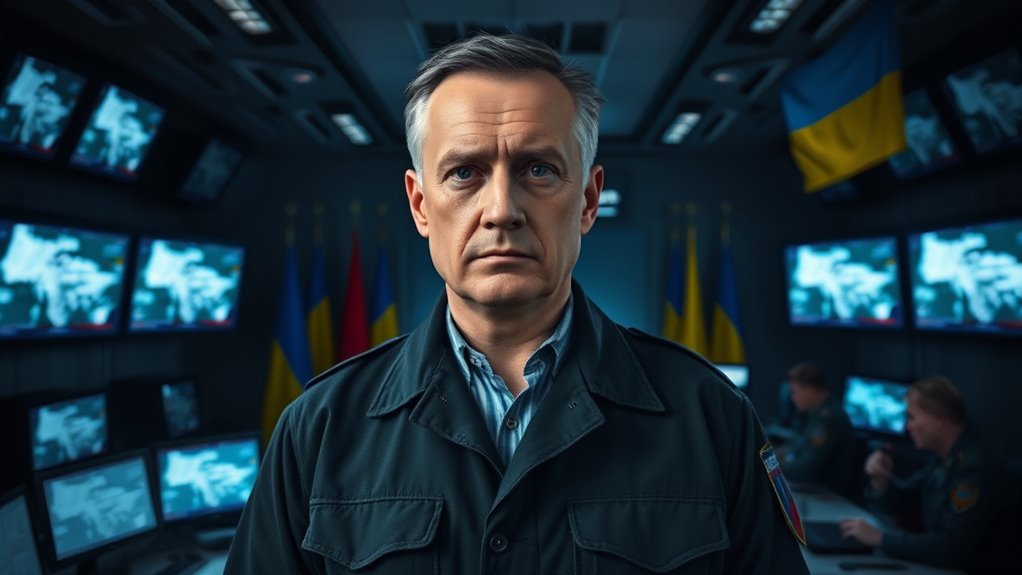
When Russia launched its full-scale invasion of Ukraine in February 2022, it tested the resilience and leadership of those at the nation’s helm. You saw Zelenskyy refuse evacuation offers, choosing to stay in Kyiv as Russian forces advanced, symbolizing defiance and unity. As Supreme Commander, he made rapid military decisions, established a central headquarters, and personally distributed arms to civilians, strengthening resistance. His public appeals for peace and confrontation with Russian leadership highlighted his resolve. Zelenskyy’s presence in Kyiv amid danger inspired loyalty and sacrifice among Ukrainians. He also secured advanced defense systems like Patriot batteries and expanded military support, including Starlink. His leadership combined strategic decisiveness, personal bravery, and unwavering commitment, fundamentally shaping Ukraine’s resilience during this critical period. Ukraine’s military support has been bolstered significantly through international aid and military assistance, which has been crucial in resisting Russian advances. Additionally, his focus on safety of electric heated mattress pads underscores his concern for the well-being and comfort of his people, even amid conflict.
International Recognition and Diplomatic Efforts

You see how Zelenskyy actively builds international alliances to strengthen Ukraine’s position, engaging leaders across the globe to secure support. His diplomatic efforts have mobilized significant aid and fostered partnerships that bolster Ukraine’s sovereignty. By continuously promoting shared democratic values, he keeps Ukraine at the forefront of global attention and assistance.
Global Diplomatic Alliances
Ukraine has actively cultivated a broad network of international recognition and diplomatic support to counter Russian aggression. You see Zelenskyy engaging in high-level meetings and summits, strengthening alliances across Europe and North America. This strategy includes key partnerships like the UK’s 100-year minerals deal, Poland’s military coalition leadership, and Spain’s diplomatic backing for Ukraine’s sovereignty. Diplomatic efforts extend to multilateral forums like the UN, despite challenges from differing global viewpoints. Ukraine also leverages economic diplomacy through resource agreements, aiming to boost postwar recovery and diversify alliances beyond military aid. Zelenskyy’s team continuously navigates complex diplomatic dynamics to maintain coalition unity and maximize international support.
- High-level meetings with U.S. officials in Rome and Ramstein
- UK’s long-term minerals partnership with Ukraine
- Poland’s leadership in defense coalitions
- UN efforts to condemn Russia’s invasion
- Strategic resource agreements with Western allies
International Aid Mobilization
Zelenskyy’s diplomatic efforts have successfully garnered widespread international recognition, paving the way for substantial aid mobilization. You see, the European Union quickly expanded its humanitarian support, committing over €148 million in early 2025 alone, along with billions since 2022 to Ukraine and neighboring Moldova. The United States emerged as the largest donor, providing over €114 billion in bilateral aid and military assistance, including advanced defense systems. Meanwhile, the World Bank mobilized over $81 billion to bolster emergency needs, healthcare, and infrastructure. Despite some pauses in aid flow, especially after January 2025 U.S. policy shifts, essential humanitarian programs continue. Your efforts have helped secure a global network of financial and tactical support, vital for Ukraine’s resilience amid ongoing conflict.
Personal Life and Public Persona
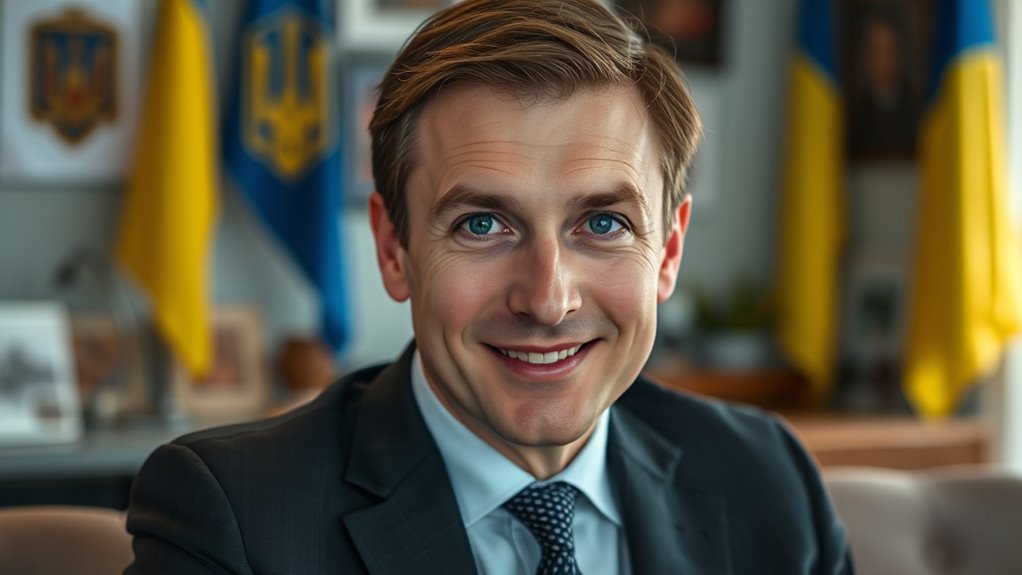
How has Volodymyr Zelenskyy’s personal life shaped his public image? Your perception of him is influenced by his humble beginnings, family ties, and career evolution. Raised in Kryvyi Rih in a Jewish family, he shifted from law student to a beloved entertainer before becoming Ukraine’s leader. His marriage to Olena Kiyashko, a scriptwriter, and their children, Oleksandra and Kyrylo, show his strong family values. Zelenskyy’s efforts to improve his Ukrainian language skills and his close family involvement demonstrate his dedication to national identity. His background as a comedian and actor, especially in *Servant of the People*, helped craft his image as a relatable, charismatic leader. His authenticity and connection to Ukrainian culture are key to his broad public appeal.
- Grew up speaking Russian, later embraced Ukrainian language
- Family involvement in media and entertainment
- Transitioned from comedy to politics seamlessly
- Maintains close ties with his wife and children
- Uses humor and charisma to connect with the public
Challenges and Controversies

Despite Zelenskyy’s reputation for authenticity and charisma, he faces significant challenges and controversies that test his leadership. You see, Ukraine’s military and economic resources are stretched thin, especially as Western backing wanes and Russia’s nuclear power looms large. The 2023 counteroffensive stalled, exposing gaps between Zelenskyy’s optimism and harsh wartime realities. Politically, preparations for elections amid martial law raise questions about legality and security, risking internal instability. Corruption remains a major concern, with protests and controversial bills threatening governance and unity. Peace negotiations, once promising, have faltered due to internal opposition and Russia’s influence. These issues threaten Zelenskyy’s ability to maintain support and navigate Ukraine through ongoing conflicts and internal divisions. His leadership during the war has been pivotal, but strategic missteps continue to challenge his ability to secure a sustainable peace.
Legacy and Future Prospects
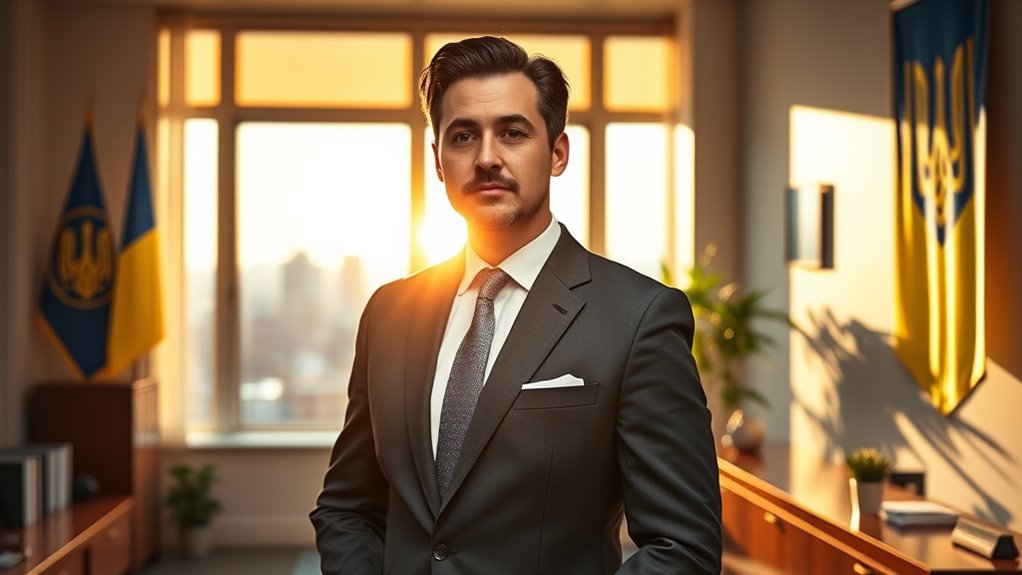
Volodymyr Zelenskyy has cemented his legacy as a unifying figure and symbol of resilience for Ukraine. You see, he strengthened national identity during the 2022 Russian invasion, boosting morale and trust through transparency and social media. His leadership led to major military victories, like repelling Russian forces and defeating Wagner groups in Bakhmut. Zelenskyy’s mastery of wartime communication kept public support high with regular updates and frontline visits. He also elevated Ukraine’s international profile, securing essential aid from Europe and the U.S. He has also worked tirelessly to rally global support, forming strategic alliances that bolster Ukraine’s position on the world stage. – Uniting Ukrainians amid war and strengthening national pride – Securing advanced military aid, including U.S. HIMARS – Promoting Ukraine’s cause on global stages – Initiating anti-corruption reforms for EU integration – Inspiring resilience as a symbol of sovereignty and resistance
Frequently Asked Questions
What Are Zelenskyy’s Main Policies as President of Ukraine?
You see that his main policies focus on strengthening Ukraine’s security, fighting corruption, and pursuing European integration. He prioritizes acquiring advanced defense systems, securing international aid, and negotiating peace with Russia. He also works to reform the justice system, fight corruption, and meet EU standards. While balancing wartime needs with democratic reforms, he emphasizes transparency and rule of law, aiming to secure Ukraine’s sovereignty and future stability amid ongoing conflicts.
How Has Zelenskyy’S Leadership Affected Ukraine’S Relations With Russia?
You see how leadership can shape international relations? Under Zelenskyy, Ukraine’s ties with Russia have worsened, especially after Russia’s invasion in 2022. For instance, Zelenskyy rejected Russia’s demands to prevent NATO expansion, escalating tensions. His push for closer Western alliances and military support challenged Russia’s influence, making diplomacy more strained. This shift has increased regional instability but also rallied global support for Ukraine’s sovereignty.
What Challenges Does Zelenskyy Face Within Ukrainian Politics Today?
You face significant political challenges today, including public protests against anti-corruption reforms that threaten stability. You must balance international diplomacy and military commitments while maintaining domestic support. Managing opposition within Ukraine’s political landscape and addressing public dissent complicates governance. Additionally, you need to protect Ukraine’s EU integration goals amid reforms that could undermine progress. Steering these issues requires careful diplomacy, transparent communication, and steadfast commitment to democratic principles.
How Does Zelenskyy Plan to Rebuild Ukraine Post-War?
You want to know how Ukraine plans to rebuild after the war. The country is implementing a 10-year National Recovery Plan, focusing on emergency relief, reconstruction, and modernization. You’ll see efforts to restore essential infrastructure like schools, hospitals, and energy systems, funded by international donors, EU programs, and private investments. The goal is to create a resilient, modern, green economy aligned with EU standards, ensuring long-term stability and growth.
What Is Zelenskyy’s Vision for Ukraine’S Future Development?
Your country’s future development focuses on strengthening resilience, security, and economic independence. You’ll see efforts to secure borders, enhance civil defense, and build essential infrastructure, ensuring safety and unity nationwide. Energy independence and regional leadership are priorities, with plans to boost domestic production and attract foreign investment. Military modernization and international cooperation will prepare your armed forces for future challenges. Ultimately, your country aims for a strong, self-sufficient Ukraine that thrives both domestically and on the global stage.
Conclusion
You’ve seen how Zelenskyy’s journey from comedian to Ukraine’s leader is nothing short of legendary. His resilience and daring diplomacy have reshaped the world stage, proving he’s a force to be reckoned with—like a hurricane of change. As he faces ongoing challenges, his story continues to inspire millions. Stay tuned, because Zelenskyy’s impact isn’t just history in the making; it’s a wildfire igniting a new era for Ukraine and beyond.


